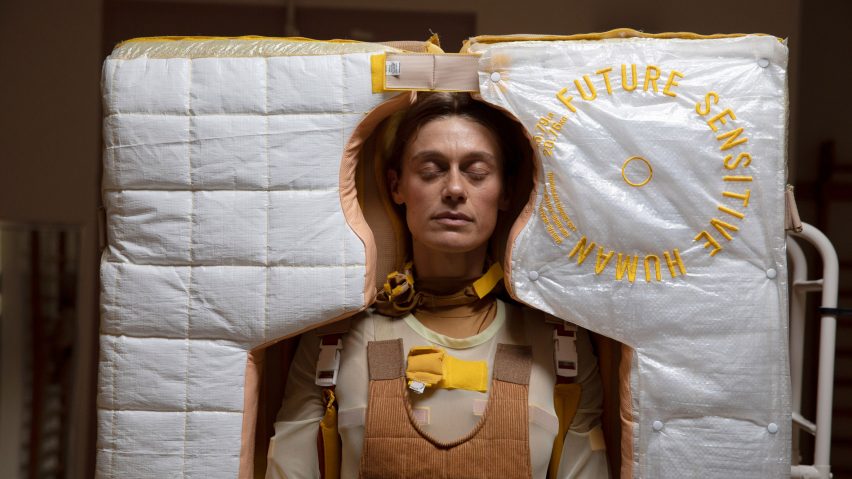Future humans grown in artificial wombs could replace the embrace of a parent with Heavy Duty Love, a machine created by sci-fi designer Lucy McRae for the Venice Architecture Biennale 2021.
The cushioned machine completely surrounds its occupant in a supportive embrace, helping them to become more comfortable with contact and intimacy.
Los Angeles-based McRae imagines it could compensate for a lack of human contact in early life, which could become a reality in the near future. Scientists believe that artificial wombs will be developed within the next decade.
"I made this machine because I am curious about the human consequences of bypassing the womb and that first hug of a 'mother'," McRae explained.
"[I'm] envisioning a new generation of children having radically different formative years, developing new types of sensitivities and neurobiological quirks. Heavy Duty Love questions whether these future sensitive humans will find new ways for intimacy and togetherness."
The machine can be used by two people at a time. They stand themselves within a frame of cushions, position their legs and arms within the straps, then the machine operators slide a section of the machine to place a final layer of cushions into place in front of them.
The cushions are made from tarpaulin, carpet underlay and industrial velcro.
The project responds directly to the biennale's theme: how will we live together? McRae believes people are at risk of losing a fundamental human connection if we move towards a future where artificial wombs become commonplace.
"Touch is said to be the first sense developed in utero – would it develop later than other senses if wombs were artificial?" she asked.
"Heavy Duty Love will act as a proxy, a comfort blanket, offering a new type of nurture for a future-sensitive human," she told Dezeen.
McRae describes herself as a "body architect". The machine is part of a series of works she has created, exploring how the human body and human condition can be engineered to adapt to changes brought on by technology.
Her Solitary Survival Raft, which she presented at Dezeen's Virtual Design Festival, is a conceptual survival raft designed to help people navigate an uncertain future, while her Compression Cradle is a machine that offers a simulated hug to a person craving intimacy.
In a previous interview with Dezeen, she said the aim behind her works is to provoke discussion about the role technology will play in our futures.
"We've been submissive to technology – it drips into our lives and we just adapt," she told Dezeen at the time. "It's important to challenge whether we really want it."
This latest project is accompanied by a range of garments with the fashion label Future Sensitive Human. The care label for the garments reads "designed for gene-edited or lab-grown babies".
Like the machine, these garments are designed to offer a form of support to their wearer. Taking cues from sportswear, sleepwear and camping gear, they incorporate straps and padding.
"The machine-wearables are mini architectures that nurture and connect the body to the device," said McRae.
McRae produced all the designs herself, having taught herself how to use an industrial sewing machine during the pandemic.
Heavy Duty Love is curated by Hashim Sarkis. It features in a section titled Among Diverse Beings, which explores the development of the human body, and how we interact with one another.
Also on show for the exhibition is Refuge for Resurgence, a dining table designed by Superflux to accommodate a multi-species banquet.
Heavy Duty Love will be on display in the Arsenale as part of the Venice Architecture Biennale, which takes place from 22 May to 21 November 2021. See Dezeen Events Guide for all the latest information you need to know to attend the event, as well as a list of other architecture and design events taking place around the world.

